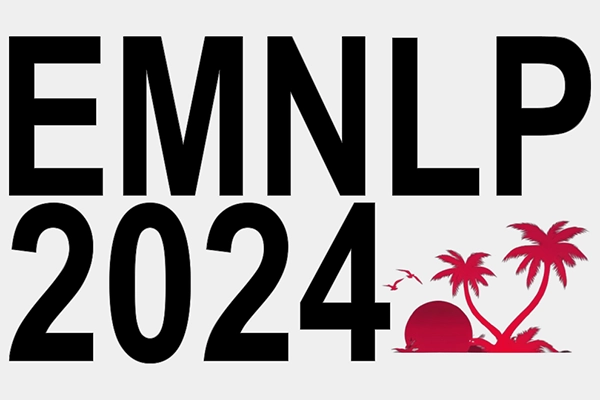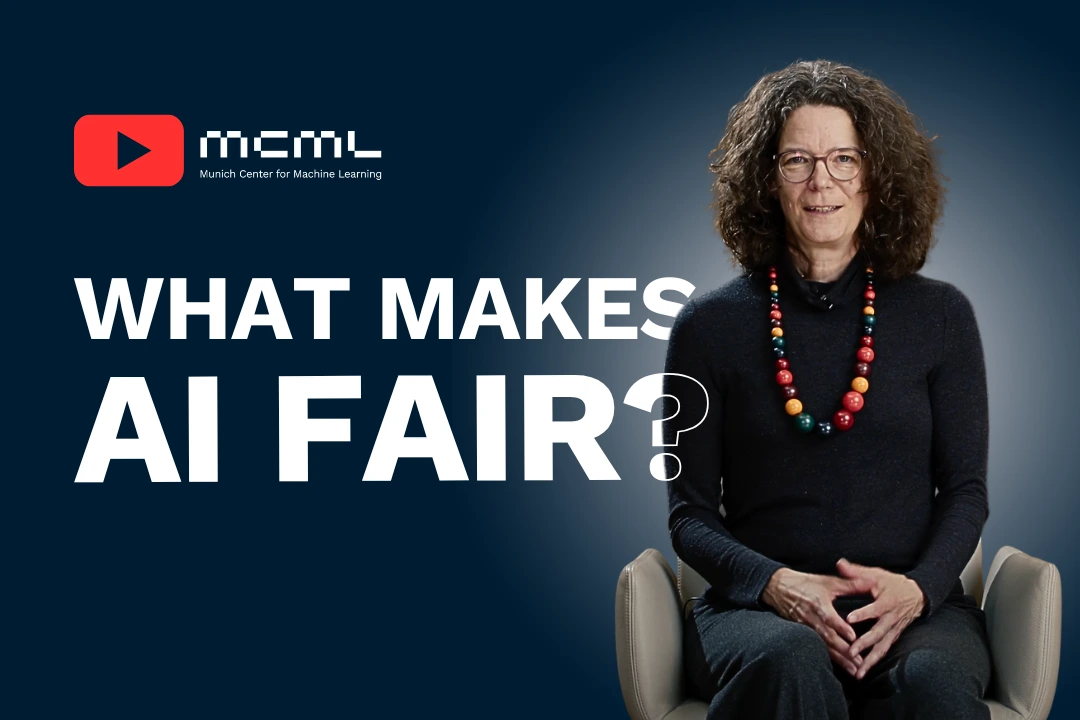06.11.2024

MCML Researchers With 22 Papers at EMNLP 2024
Conference on Empirical Methods in Natural Language Processing (EMNLP 2024). Miami, FL, USA, 12.11.2024–16.11.2024
We are happy to announce that MCML researchers are represented with 22 papers at EMNLP 2024. Congrats to our researchers!
Main Track (6 papers)
Subword Segmentation in LLMs: Looking at Inflection and Consistency.
EMNLP 2024 - Conference on Empirical Methods in Natural Language Processing. Miami, FL, USA, Nov 12-16, 2024. DOI
Abstract
The role of subword segmentation in relation to capturing morphological patterns in LLMs is currently not well explored. Ideally, one would train models like GPT using various segmentations and evaluate how well word meanings are captured. Since this is not computationally feasible, we group words according to their segmentation properties and compare how well a model can solve a linguistic task for these groups. We study two criteria: (i) adherence to morpheme boundaries and (ii) the segmentation consistency of the different inflected forms of a lemma. We select word forms with high and low values for these criteria and carry out experiments on GPT-4o’s ability to capture verbal inflection for 10 languages. Our results indicate that in particular the criterion of segmentation consistency can help to predict the model’s ability to recognize and generate the lemma from an inflected form, providing evidence that subword segmentation is relevant.
MCML Authors
CUTE: Measuring LLMs’ Understanding of Their Tokens.
EMNLP 2024 - Conference on Empirical Methods in Natural Language Processing. Miami, FL, USA, Nov 12-16, 2024. DOI
Abstract
Large Language Models (LLMs) show remarkable performance on a wide variety of tasks. Most LLMs split text into multi-character tokens and process them as atomic units without direct access to individual characters. This raises the question: To what extent can LLMs learn orthographic information? To answer this, we propose a new benchmark, CUTE, which features a collection of tasks designed to test the orthographic knowledge of LLMs. We evaluate popular LLMs on CUTE, finding that most of them seem to know the spelling of their tokens, yet fail to use this information effectively to manipulate text, calling into question how much of this knowledge is generalizable.
MCML Authors
Data Analytics & Statistics
Style-Specific Neurons for Steering LLMs in Text Style Transfer.
EMNLP 2024 - Conference on Empirical Methods in Natural Language Processing. Miami, FL, USA, Nov 12-16, 2024. DOI
Abstract
Text style transfer (TST) aims to modify the style of a text without altering its original meaning. Large language models (LLMs) demonstrate superior performance across multiple tasks, including TST. However, in zero-shot setups, they tend to directly copy a significant portion of the input text to the output without effectively changing its style. To enhance the stylistic variety and fluency of the text, we present sNeuron-TST, a novel approach for steering LLMs using style-specific neurons in TST. Specifically, we identify neurons associated with the source and target styles and deactivate source-style-only neurons to give target-style words a higher probability, aiming to enhance the stylistic diversity of the generated text. However, we find that this deactivation negatively impacts the fluency of the generated text, which we address by proposing an improved contrastive decoding method that accounts for rapid token probability shifts across layers caused by deactivated source-style neurons. Empirical experiments demonstrate the effectiveness of the proposed method on six benchmarks, encompassing formality, toxicity, politics, politeness, authorship, and sentiment.
MCML Authors
GDTB: Genre Diverse Data for English Shallow Discourse Parsing across Modalities, Text Types, and Domains.
EMNLP 2024 - Conference on Empirical Methods in Natural Language Processing. Miami, FL, USA, Nov 12-16, 2024. DOI
Abstract
Work on shallow discourse parsing in English has focused on the Wall Street Journal corpus, the only large-scale dataset for the language in the PDTB framework. However, the data is not openly available, is restricted to the news domain, and is by now 35 years old. In this paper, we present and evaluate a new open-access, multi-genre benchmark for PDTB-style shallow discourse parsing, based on the existing UD English GUM corpus, for which discourse relation annotations in other frameworks already exist. In a series of experiments on cross-domain relation classification, we show that while our dataset is compatible with PDTB, substantial out-of-domain degradation is observed, which can be alleviated by joint training on both datasets.
MCML Authors
AI and Computational Linguistics
HiFT: A Hierarchical Full Parameter Fine-Tuning Strategy.
EMNLP 2024 - Conference on Empirical Methods in Natural Language Processing. Miami, FL, USA, Nov 12-16, 2024. DOI
Abstract
Full-parameter fine-tuning has become the go-to choice for adapting language models (LMs) to downstream tasks due to its excellent performance. As LMs grow in size, fine-tuning the full parameters of LMs requires a prohibitively large amount of GPU memory. Existing approaches utilize zeroth-order optimizer to conserve GPU memory, which can potentially compromise the performance of LMs as non-zero order optimizers tend to converge more readily on most downstream tasks. In this paper, we propose a novel optimizer-independent end-to-end hierarchical fine-tuning strategy, HiFT, which only updates a subset of parameters at each training step. HiFT can significantly reduce the amount of gradients and optimizer state parameters residing in GPU memory at the same time, thereby reducing GPU memory usage. Our results demonstrate that: (1) HiFT achieves comparable performance to parameter-efficient fine-tuning and standard full parameter fine-tuning. (2) HiFT supports various optimizers including AdamW, AdaGrad, SGD, etc. (3) HiFT can save more than 60% GPU memory compared with standard full-parameter fine-tuning for 7B model. (4) HiFT enables full-parameter fine-tuning of a 7B model on single 48G A6000 with a precision of 32 using the AdamW optimizer, without using any memory saving techniques.
MCML Authors
Liar, Liar, Logical Mire: A Benchmark for Suppositional Reasoning in Large Language Models.
EMNLP 2024 - Conference on Empirical Methods in Natural Language Processing. Miami, FL, USA, Nov 12-16, 2024. DOI
Abstract
Knights and knaves problems represent a classic genre of logical puzzles where characters either tell the truth or lie. The objective is to logically deduce each character’s identity based on their statements. The challenge arises from the truth-telling or lying behavior, which influences the logical implications of each statement. Solving these puzzles requires not only direct deductions from individual statements, but the ability to assess the truthfulness of statements by reasoning through various hypothetical scenarios. As such, knights and knaves puzzles serve as compelling examples of suppositional reasoning. In this paper, we introduce TruthQuest, a benchmark for suppositional reasoning based on the principles of knights and knaves puzzles. Our benchmark presents problems of varying complexity, considering both the number of characters and the types of logical statements involved. Evaluations on TruthQuest show that large language models like Llama 3 and Mixtral-8x7B exhibit significant difficulties solving these tasks. A detailed error analysis of the models’ output reveals that lower-performing models exhibit a diverse range of reasoning errors, frequently failing to grasp the concept of truth and lies. In comparison, more proficient models primarily struggle with accurately inferring the logical implications of potentially false statements.
MCML Authors
AI and Computational Linguistics
Findings Track (14 papers)
I’m sure you’re a real scholar yourself: Exploring Ironic Content Generation by Large Language Models.
EMNLP 2024 - Findings of the Conference on Empirical Methods in Natural Language Processing. Miami, FL, USA, Nov 12-16, 2024. DOI
Abstract
Generating ironic content is challenging: it requires a nuanced understanding of context and implicit references and balancing seriousness and playfulness. Moreover, irony is highly subjective and can depend on various factors, such as social, cultural, or generational aspects. This paper explores whether Large Language Models (LLMs) can learn to generate ironic responses to social media posts. To do so, we fine-tune two models to generate ironic and non-ironic content and deeply analyze their outputs’ linguistic characteristics, their connection to the original post, and their similarity to the human-written replies. We also conduct a large-scale human evaluation of the outputs. Additionally, we investigate whether LLMs can learn a form of irony tied to a generational perspective, with mixed results.
MCML Authors
AI and Computational Linguistics
'Seeing the Big through the Small': Can LLMs Approximate Human Judgment Distributions on NLI from a Few Explanations?
EMNLP 2024 - Findings of the Conference on Empirical Methods in Natural Language Processing. Miami, FL, USA, Nov 12-16, 2024. DOI
Abstract
Human label variation (HLV) is a valuable source of information that arises when multiple human annotators provide different labels for valid reasons. In Natural Language Inference (NLI) earlier approaches to capturing HLV involve either collecting annotations from many crowd workers to represent human judgment distribution (HJD) or use expert linguists to provide detailed explanations for their chosen labels. While the former method provides denser HJD information, obtaining it is resource-intensive. In contrast, the latter offers richer textual information but it is challenging to scale up to many human judges. Besides, large language models (LLMs) are increasingly used as evaluators (‘LLM judges’) but with mixed results, and few works aim to study HJDs. This study proposes to exploit LLMs to approximate HJDs using a small number of expert labels and explanations. Our experiments show that a few explanations significantly improve LLMs’ ability to approximate HJDs with and without explicit labels, thereby providing a solution to scale up annotations for HJD. However, fine-tuning smaller soft-label aware models with the LLM-generated model judgment distributions (MJDs) presents partially inconsistent results: while similar in distance, their resulting fine-tuned models and visualized distributions differ substantially. We show the importance of complementing instance-level distance measures with a global-level shape metric and visualization to more effectively evaluate MJDs against human judgment distributions.
MCML Authors
AI and Computational Linguistics
AI and Computational Linguistics
AI and Computational Linguistics
Temporal Fact Reasoning over Hyper-Relational Knowledge Graphs.
EMNLP 2024 - Findings of the Conference on Empirical Methods in Natural Language Processing. Miami, FL, USA, Nov 12-16, 2024. DOI
Abstract
Stemming from traditional knowledge graphs (KGs), hyper-relational KGs (HKGs) provide additional key-value pairs (i.e., qualifiers) for each KG fact that help to better restrict the fact validity. In recent years, there has been an increasing interest in studying graph reasoning over HKGs. Meanwhile, as discussed in recent works that focus on temporal KGs (TKGs), world knowledge is ever-evolving, making it important to reason over temporal facts in KGs. Previous mainstream benchmark HKGs do not explicitly specify temporal information for each HKG fact. Therefore, almost all existing HKG reasoning approaches do not devise any module specifically for temporal reasoning. To better study temporal fact reasoning over HKGs, we propose a new type of data structure named hyper-relational TKG (HTKG). Every fact in an HTKG is coupled with a timestamp explicitly indicating its time validity. We develop two new benchmark HTKG datasets, i.e., Wiki-hy and YAGO-hy, and propose an HTKG reasoning model that efficiently models hyper-relational temporal facts. To support future research on this topic, we open-source our datasets and model.
MCML Authors
Adaptive Contrastive Search: Uncertainty-Guided Decoding for Open-Ended Text Generation.
EMNLP 2024 - Findings of the Conference on Empirical Methods in Natural Language Processing. Miami, FL, USA, Nov 12-16, 2024. DOI
Abstract
Decoding from the output distributions of large language models to produce high-quality text is a complex challenge in language modeling. Various approaches, such as beam search, sampling with temperature, k−sampling, nucleus p−sampling, typical decoding, contrastive decoding, and contrastive search, have been proposed to address this problem, aiming to improve coherence, diversity, as well as resemblance to human-generated text. In this study, we introduce adaptive contrastive search, a novel decoding strategy extending contrastive search by incorporating an adaptive degeneration penalty, guided by the estimated uncertainty of the model at each generation step. This strategy is designed to enhance both the creativity and diversity of the language modeling process while at the same time producing coherent and high-quality generated text output. Our findings indicate performance enhancement in both aspects, across different model architectures and datasets, underscoring the effectiveness of our method in text generation tasks. Our code base, datasets, and models are publicly available.
MCML Authors
Statistical Learning and Data Science
Statistical Learning and Data Science
LongForm: Effective Instruction Tuning with Reverse Instructions.
EMNLP 2024 - Findings of the Conference on Empirical Methods in Natural Language Processing. Miami, FL, USA, Nov 12-16, 2024. DOI GitHub
Abstract
Instruction tuning enables language models to more effectively generalize and better follow user intent. However, obtaining instruction data is costly and challenging. Prior work employs methods such as expensive human annotation, crowd-sourced datasets with alignment issues, and generating noisy examples via LLMs. We introduce the LongForm-C dataset, which is created by reverse instructions. We generate instructions via LLMs for human-written corpus examples using reverse instructions. First we select a diverse set of human-written documents from corpora such as C4 and Wikipedia; then we generate instructions for these documents via LLMs. This approach provides a cheaper and cleaner instruction-tuning dataset with natural output and one suitable for long text generation. Our models outperform 10x larger language models without instruction tuning on tasks such as story/recipe generation and long-form question answering. Moreover, LongForm models outperform prior instruction-tuned models such as FLAN-T5 and Alpaca by a large margin, and improve language understanding capabilities further.
MCML Authors
Computational Linguistics
VideoINSTA: Zero-shot Long Video Understanding via Informative Spatial-Temporal Reasoning with LLMs.
EMNLP 2024 - Findings of the Conference on Empirical Methods in Natural Language Processing. Miami, FL, USA, Nov 12-16, 2024. DOI GitHub
Abstract
In the video-language domain, recent works in leveraging zero-shot Large Language Model-based reasoning for video understanding have become competitive challengers to previous end-to-end models. However, long video understanding presents unique challenges due to the complexity of reasoning over extended timespans, even for zero-shot LLM-based approaches. The challenge of information redundancy in long videos prompts the question of what specific information is essential for large language models (LLMs) and how to leverage them for complex spatial-temporal reasoning in long-form video analysis. We propose a framework VideoINSTA, i.e. INformative Spatial-TemporAl Reasoning for zero-shot long-form video understanding. VideoINSTA contributes (1) a zero-shot framework for long video understanding using LLMs; (2) an event-based temporal reasoning and content-based spatial reasoning approach for LLMs to reason over spatial-temporal information in videos; (3) a self-reflective information reasoning scheme balancing temporal factors based on information sufficiency and prediction confidence. Our model significantly improves the state-of-the-art on three long video question-answering benchmarks: EgoSchema, NextQA, and IntentQA, and the open question answering dataset ActivityNetQA.
MCML Authors
Computer Aided Medical Procedures & Augmented Reality
The Potential and Challenges of Evaluating Attitudes, Opinions, and Values in Large Language Models.
EMNLP 2024 - Findings of the Conference on Empirical Methods in Natural Language Processing. Miami, FL, USA, Nov 12-16, 2024. DOI
Abstract
Recent advances in Large Language Models (LLMs) have sparked wide interest in validating and comprehending the human-like cognitive-behavioral traits LLMs may capture and convey. These cognitive-behavioral traits include typically Attitudes, Opinions, Values (AOVs). However, measuring AOVs embedded within LLMs remains opaque, and different evaluation methods may yield different results. This has led to a lack of clarity on how different studies are related to each other and how they can be interpreted. This paper aims to bridge this gap by providing a comprehensive overview of recent works on the evaluation of AOVs in LLMs. Moreover, we survey related approaches in different stages of the evaluation pipeline in these works. By doing so, we address the potential and challenges with respect to understanding the model, human-AI alignment, and downstream application in social sciences. Finally, we provide practical insights into evaluation methods, model enhancement, and interdisciplinary collaboration, thereby contributing to the evolving landscape of evaluating AOVs in LLMs.
MCML Authors
AI and Computational Linguistics
Social Data Science and AI
Consistent Document-Level Relation Extraction via Counterfactuals.
EMNLP 2024 - Findings of the Conference on Empirical Methods in Natural Language Processing. Miami, FL, USA, Nov 12-16, 2024. DOI
Abstract
Many datasets have been developed to train and evaluate document-level relation extraction (RE) models. Most of these are constructed using real-world data. It has been shown that RE models trained on real-world data suffer from factual biases. To evaluate and address this issue, we present CovEReD, a counterfactual data generation approach for document-level relation extraction datasets using entity replacement. We first demonstrate that models trained on factual data exhibit inconsistent behavior: while they accurately extract triples from factual data, they fail to extract the same triples after counterfactual modification. This inconsistency suggests that models trained on factual data rely on spurious signals such as specific entities and external knowledge – rather than on the input context – to extract triples. We show that by generating document-level counterfactual data with CovEReD and training models on them, consistency is maintained with minimal impact on RE performance. We release our CovEReD pipeline as well as Re-DocRED-CF, a dataset of counterfactual RE documents, to assist in evaluating and addressing inconsistency in document-level RE.
MCML Authors
Computational Linguistics
To Know or Not To Know? Analyzing Self-Consistency of Large Language Models under Ambiguity.
EMNLP 2024 - Findings of the Conference on Empirical Methods in Natural Language Processing. Miami, FL, USA, Nov 12-16, 2024. DOI
Abstract
One of the major aspects contributing to the striking performance of large language models (LLMs) is the vast amount of factual knowledge accumulated during pre-training. Yet, many LLMs suffer from self-inconsistency, which raises doubts about their trustworthiness and reliability. This paper focuses on entity type ambiguity, analyzing the proficiency and consistency of state-of-the-art LLMs in applying factual knowledge when prompted with ambiguous entities. To do so, we propose an evaluation protocol that disentangles knowing from applying knowledge, and test state-of-the-art LLMs on 49 ambiguous entities. Our experiments reveal that LLMs struggle with choosing the correct entity reading, achieving an average accuracy of only 85%, and as low as 75% with underspecified prompts. The results also reveal systematic discrepancies in LLM behavior, showing that while the models may possess knowledge, they struggle to apply it consistently, exhibit biases toward preferred readings, and display self-inconsistencies. This highlights the need to address entity ambiguity in the future for more trustworthy LLMs.
MCML Authors
AI and Computational Linguistics
Better Call SAUL: Fluent and Consistent Language Model Editing with Generation Regularization.
EMNLP 2024 - Findings of the Conference on Empirical Methods in Natural Language Processing. Miami, FL, USA, Nov 12-16, 2024. DOI
Abstract
To ensure large language models contain up-to-date knowledge, they need to be updated regularly. However, model editing is challenging as it might also affect knowledge that is unrelated to the new data. State-of-the-art methods identify parameters associated with specific knowledge and then modify them via direct weight updates. However, these locate-and-edit methods suffer from heavy computational overhead and lack theoretical validation. In contrast, directly fine-tuning the model on requested edits affects the model’s behavior on unrelated knowledge, and significantly damages the model’s generation fluency and consistency. To address these challenges, we propose SAUL, a streamlined model editing method that uses sentence concatenation with augmented random facts for generation regularization. Evaluations on three model editing benchmarks show that SAUL is a practical and reliable solution for model editing outperforming state-of-the-art methods while maintaining generation quality and reducing computational overhead.
MCML Authors
Breaking the Script Barrier in Multilingual Pre-Trained Language Models with Transliteration-Based Post-Training Alignment.
EMNLP 2024 - Findings of the Conference on Empirical Methods in Natural Language Processing. Miami, FL, USA, Nov 12-16, 2024. DOI GitHub
Abstract
Multilingual pre-trained models (mPLMs) have shown impressive performance on cross-lingual transfer tasks. However, the transfer performance is often hindered when a low-resource target language is written in a different script than the high-resource source language, even though the two languages may be related or share parts of their vocabularies. Inspired by recent work that uses transliteration to address this problem, our paper proposes a transliteration-based post-pretraining alignment (PPA) method aiming to improve the cross-lingual alignment between languages using diverse scripts. We select two areal language groups, Mediterranean-Amharic-Farsi and South+East Asian Languages, wherein the languages are mutually influenced but use different scripts. We apply our method to these language groups and conduct extensive experiments on a spectrum of downstream tasks. The results show that after PPA, models consistently outperform the original model (up to 50% for some tasks) in English-centric transfer. In addition, when we use languages other than English as sources in transfer, our method obtains even larger improvements.
MCML Authors
TurkishMMLU: Measuring Massive Multitask Language Understanding in Turkish.
EMNLP 2024 - Findings of the Conference on Empirical Methods in Natural Language Processing. Miami, FL, USA, Nov 12-16, 2024. DOI GitHub
Abstract
Multiple choice question answering tasks evaluate the reasoning, comprehension, and mathematical abilities of Large Language Models (LLMs). While existing benchmarks employ automatic translation for multilingual evaluation, this approach is error-prone and potentially introduces culturally biased questions, especially in social sciences. We introduce the first multitask, multiple-choice Turkish QA benchmark, TurkishMMLU, to evaluate LLMs’ understanding of the Turkish language. TurkishMMLU includes over 10,000 questions, covering 9 different subjects from Turkish high-school education curricula. These questions are written by curriculum experts, suitable for the high-school curricula in Turkey, covering subjects ranging from natural sciences and math questions to more culturally representative topics such as Turkish Literature and the history of the Turkish Republic. We evaluate over 20 LLMs, including multilingual open-source (e.g., Gemma, Llama, MT5), closed-source (GPT 4o, Claude, Gemini), and Turkish-adapted (e.g., Trendyol) models. We provide an extensive evaluation, including zero-shot and few-shot evaluation of LLMs, chain-of-thought reasoning, and question difficulty analysis along with model performance. We provide an in-depth analysis of the Turkish capabilities and limitations of current LLMs to provide insights for future LLMs for the Turkish language.
MCML Authors
Computational Linguistics
Visual Question Decomposition on Multimodal Large Language Models.
EMNLP 2024 - Findings of the Conference on Empirical Methods in Natural Language Processing. Miami, FL, USA, Nov 12-16, 2024. DOI
Abstract
Question decomposition has emerged as an effective strategy for prompting Large Language Models (LLMs) to answer complex questions. However, while existing methods primarily focus on unimodal language models, the question decomposition capability of Multimodal Large Language Models (MLLMs) has yet to be explored. To this end, this paper explores visual question decomposition on MLLMs. Specifically, we introduce a systematic evaluation framework including a dataset and several evaluation criteria to assess the quality of the decomposed sub-questions, revealing that existing MLLMs struggle to produce high-quality sub-questions. To address this limitation, we propose a specific finetuning dataset, DecoVQA+, for enhancing the model’s question decomposition capability. Aiming at enabling models to perform appropriate selective decomposition, we propose an efficient finetuning pipeline. The finetuning pipeline consists of our proposed dataset and a training objective for selective decomposition. Finetuned MLLMs demonstrate significant improvements in the quality of sub-questions and the policy of selective question decomposition. Additionally, the models also achieve higher accuracy with selective decomposition on VQA benchmark datasets.
MCML Authors
SynthEval: Hybrid Behavioral Testing of NLP Models with Synthetic Evaluation.
EMNLP 2024 - Findings of the Conference on Empirical Methods in Natural Language Processing. Miami, FL, USA, Nov 12-16, 2024. DOI GitHub
Abstract
Traditional benchmarking in NLP typically involves using static held-out test sets. However, this approach often results in an overestimation of performance and lacks the ability to offer comprehensive, interpretable, and dynamic assessments of NLP models. Recently, works like DynaBench (Kiela et al., 2021) and CheckList (Ribeiro et al., 2020) have addressed these limitations through behavioral testing of NLP models with test types generated by a multistep human-annotated pipeline. Unfortunately, manually creating a variety of test types requires much human labor, often at prohibitive cost. In this work, we propose SYNTHEVAL, a hybrid behavioral testing framework that leverages large language models (LLMs) to generate a wide range of test types for a comprehensive evaluation of NLP models. SYNTHEVAL first generates sentences via LLMs using controlled generation, and then identifies challenging examples by comparing the predictions made by LLMs with task-specific NLP models. In the last stage, human experts investigate the challenging examples, manually design templates, and identify the types of failures the taskspecific models consistently exhibit. We apply SYNTHEVAL to two classification tasks, sentiment analysis and toxic language detection, and show that our framework is effective in identifying weaknesses of strong models on these tasks.
MCML Authors
AI and Computational Linguistics
Computational Linguistics
Workshops (2 papers)
CUNI and LMU Submission to the MRL 2024 Shared Task on Multi-lingual Multi-task Information Retrieval.
MRL @EMNLP 2024 - 4th Multilingual Representation Learning Workshop at the Conference on Empirical Methods in Natural Language Processing (EMNLP 2024). Miami, FL, USA, Nov 12-16, 2024. DOI
Abstract
We present the joint CUNI and LMU submission to the MRL 2024 Shared Task on Multi-lingual Multi-task Information Retrieval. The shared task objective was to explore how we can deploy modern methods in NLP in multi-lingual low-resource settings, tested on two sub-tasks: Named-entity recognition and question answering. Our solutions to the subtasks are based on data acquisition and model adaptation. We compare the performance of our submitted systems with the translate-test approach which proved to be the most useful in the previous edition of the shared task. Our results show that using more data as well as fine-tuning recent multilingual pre-trained models leads to considerable improvements over the translate-test baseline.
MCML Authors
Data Analytics & Statistics
MultiClimate: Multimodal Stance Detection on Climate Change Videos.
NLP4PI @EMNLP 2024 - 3rd Workshop on NLP for Positive Impact at the Conference on Empirical Methods in Natural Language Processing (EMNLP 2024). Miami, FL, USA, Nov 12-16, 2024. DOI GitHub
Abstract
Climate change (CC) has attracted increasing attention in NLP in recent years. However, detecting the stance on CC in multimodal data is understudied and remains challenging due to a lack of reliable datasets. To improve the understanding of public opinions and communication strategies, this paper presents MultiClimate, the first open-source manually-annotated stance detection dataset with 100 CC-related YouTube videos and 4,209 frame-transcript pairs. We deploy state-of-the-art vision and language models, as well as multimodal models for MultiClimate stance detection. Results show that text-only BERT significantly outperforms image-only ResNet50 and ViT. Combining both modalities achieves state-of-the-art, 0.747/0.749 in accuracy/F1. Our 100M-sized fusion models also beat CLIP and BLIP, as well as the much larger 9B-sized multimodal IDEFICS and text-only Llama3 and Gemma2, indicating that multimodal stance detection remains challenging for large language models.
MCML Authors
AI and Computational Linguistics
06.11.2024
Related

25.06.2025
When Clinical Expertise Meets AI Innovation – With Michael Ingrisch
The new research film features Michael Ingrisch, who shows how AI and clinical expertise can solve real challenges in radiology together.

23.06.2025
Autonomous Driving: From Infinite Possibilities to Safe Decisions— With Matthias Althoff
The new research film features Matthias Althoff explaining how his team verifies autonomous vehicle safety using EDGAR and rigorous testing.

20.06.2025
ERC Advanced Grant for Massimo Fornasier
Massimo Fornasier was awarded ERC Advanced Grant to develop advanced algorithms for solving complex nonconvex optimization problems.

18.06.2025
ERC Advanced Grant for Albrecht Schmidt
Albrecht Schmidt receives ERC Advanced Grant for research on personalized generative AI to support memory, planning, and creativity.






























